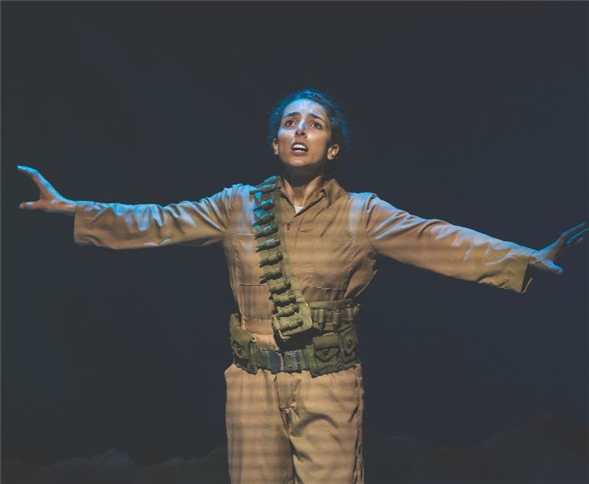Translate Page

National Yiddish Theatre Folksbiene revives David Schechter's play about the "Israeli Joan of Arc"
---
It's impossible to see Hannah Senesh and not think of Anne Frank. In the one-woman play, which is being presented in English by National Yiddish Theatre Folksbiene at the Museum of Jewish Heritage, Lexi Rabadi portrays the real-life title character, a Jewish teenager in Hungary in the 1930s who started keeping a diary at age 13. In it, she complains about the ugly pink party dress her mother bought for her, dreams of her "ideal boy" and observes the growing anti-Semitism around her.
Senesh, like Frank, wanted to grow up to be a writer. And, perhaps most remarkably, they shared an almost identical idealism. "In spite of everything I still believe that people are really good at heart," Frank famously wrote in her diary. "Despite everything I do believe that the world was created for good," Senesh wrote in hers.
Senesh was killed in 1944, one year before Frank, though under very different circumstances.
Notwithstanding the striking similarities between their stories, it becomes clear halfway through Hannah Senesh how unique hers was. In 1939 at the age of 18, Senesh was able to get out of Europe and immigrate to Palestine, where she studied at an agricultural college and worked on a kibbutz. Yet four years later, determined to do something about the horrors of the Holocaust, she returned as a paratrooper on a military mission to Yugoslavia to rescue British soldiers caught behind enemy lines. Her intention was to then cross into Hungary to help Jews in her homeland escape, but things did not go as planned.
"She was an ordinary person who became extraordinary when the times demanded it," says David Schechter, who wrote Hannah Senesh in 1984 and is directing this revival. The production kicks off Folksbiene's 105th season, which has a theme of "spiritual resistance," with all shows complementing the exhibit Auschwitz: Not long ago. Not far away., currently on display at the Museum of Jewish Heritage.
Jewish theatre is Schechter's specialty, with his most high-profile work being Soul Doctor, a musical about the songwriting rabbi Shlomo Carlebach, which played on Broadway in 2013. But such a focus was not foreordained. A theatre enthusiast from an early age, Schechter studied at Bard College with Elizabeth Swados, who ended up casting him in nine of her shows, including Runaways, which marked his Broadway debut as a performer in 1978. As a fan of Yiddish writer Isaac Bashevis Singer's "mystical" works, Schechter decided to adapt his short story "Gimpel the Fool" for the stage a few years later. The result was acclaim -- including a complimentary letter from Singer himself -- and a career trajectory. "People started sending me Jewish material to work on," Schechter recalls.
That's how he received Senesh's diary, which was published in an English translation in the '70s. "I read it and I very much related to the struggle she had between wanting to be an artist and wanting to have an impact on her community, not just through the arts," Schechter says. He decided that the best form for a stage adaptation would be a one-woman show because "I wanted Hannah to tell her own story."
Schecter estimates that about 40 percent of the words in the play come verbatim from Senesh's diary, letters and poems (several of the latter are set to music and sung in the show). But even the passages he invented sound like her. "I wanted to communicate what was going on inside her not just the external circumstances," he explains. "I started to write things in her voice because I got to know her voice."
The play has enjoyed numerous productions in Israel, where, according to Schecter, Henesh is "sometimes called the Israeli Joan of Arc. Every town seems to have something named after her -- a street or a hospital." He describes mounting the play for Senesh's brother and mother in Israel as "a pinnacle experience of my life."
With the alarming increase in hate crimes of late, including anti-Semitism, Schecter believes the time is right for a revival. As he puts it: "There is a rising tide of racism, which gives the production and everybody working on it a sense of urgency."
But it's not just Senesh's heroism that makes an impact. Her poems also provide much-needed uplift. One of Schecter's favorites is about Senesh's father, a journalist and playwright who died when she was six. But Schecter believes the lines also apply to Senesh and her legacy:
"There are stars whose radiance is visible on Earth though they have long been extinct. There are people whose brilliance continues to light the world though they are no longer among the living. And when the night is especially dark, these lights burn the brightest. They help to light the way."
---
TDF MEMBERS: At press time, discount tickets were available for Hannah Senesh. Go here to browse our current offers.
Jonathan Mandell is a drama critic and journalist based in New York. Visit his blog at NewYorkTheater.me or follow him on Twitter at @NewYorkTheater. Follow TDF at @TDFNYC.
Top image: Lexi Rabadi in Hannah Senesh. Photos by Victor Nechay – Properpix.com.